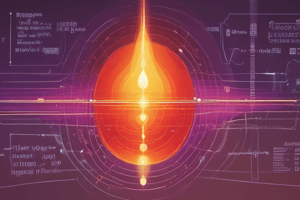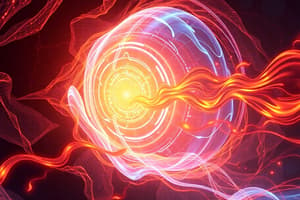Podcast
Questions and Answers
What is the branch of classical physics that delves into the behavior of matter under temperature gradients and energy transformations?
What is the branch of classical physics that delves into the behavior of matter under temperature gradients and energy transformations?
- Thermodynamics
- Thermal Physics (correct)
- Quantum Mechanics
- Astrophysics
Which approach in thermal physics involves using mathematics and models to explain current phenomena and predict new ones?
Which approach in thermal physics involves using mathematics and models to explain current phenomena and predict new ones?
- Observational
- Theoretical (correct)
- Experimental
- Computational
What is a measure of the average kinetic energy of a substance's microscopic constituents?
What is a measure of the average kinetic energy of a substance's microscopic constituents?
- Volume
- Temperature (correct)
- Pressure
- Density
Which type of researchers test theoretical predictions and investigate observable interactions and physical behavior?
Which type of researchers test theoretical predictions and investigate observable interactions and physical behavior?
What is the category of physics problems that computational physicists apply numerical analysis and techniques to?
What is the category of physics problems that computational physicists apply numerical analysis and techniques to?
Which field underpins our understanding of heat, energy, and the laws that govern them?
Which field underpins our understanding of heat, energy, and the laws that govern them?
What is the state at which a system's properties do not change with time?
What is the state at which a system's properties do not change with time?
Which branch of physics provides a probabilistic interpretation of thermodynamics?
Which branch of physics provides a probabilistic interpretation of thermodynamics?
How does heat transfer occur between objects?
How does heat transfer occur between objects?
What do thermal physicists in the medical field study?
What do thermal physicists in the medical field study?
Where might a thermal physicist work if they are studying climate change?
Where might a thermal physicist work if they are studying climate change?
How can a physicist apply knowledge of thermal physics in industry?
How can a physicist apply knowledge of thermal physics in industry?
Flashcards are hidden until you start studying
Study Notes
Thermal Physics: A Deeper Dive into the World of Heat and Energy
Thermal physics, a branch of classical physics, delves into the behavior of matter under temperature gradients and energy transformations. This field is integral to our everyday lives, from the warmth of our homes to the efficiency of our vehicles. Let's explore how thermal physics underpins our understanding of heat, energy, and the laws that govern them.
Research Approaches in Thermal Physics
Thermal physics research can be categorized into three approaches:
-
Theoretical: Physicists use mathematics and models to explain current phenomena, predict new ones, and describe the laws of the universe. Examples include the development of statistical mechanics, thermodynamics, and the study of phase transitions.
-
Experimental: Researchers test theoretical predictions and investigate observable interactions and physical behavior. This includes building and operating instrumentation, such as equipment for measuring temperature or observing phase changes.
-
Computational: Physicists apply numerical analysis and other computational techniques to physics problems, such as large-scale weather simulations, investigations of materials properties, or models of protein folding.
Key Concepts and Applications
Temperature and Thermodynamics
Temperature is a measure of the average kinetic energy of a substance's microscopic constituents. Thermodynamics, which includes the First, Second, and Third Laws, describes the interrelationships between energy, work, heat, and temperature changes in a system.
Equilibrium and Phase Transitions
Equilibrium is the state at which a system's properties do not change with time. Phase transitions are the changes in a substance's state, such as solid, liquid, and gas. The laws of thermodynamics, including the Clausius-Clapeyron equation, govern these transitions.
Statistical Mechanics
Statistical mechanics is the probabilistic interpretation of thermodynamics based on statistical ensembles. It provides a method for calculating macroscopic properties of a system from the behavior of its constituent particles.
Heat Transfer
Heat transfer occurs when thermal energy moves from one object or region to another by conduction, convection, or radiation. This leads to phenomena like heat flow in solids, convective currents in fluids, and light emitted by hot objects.
Applied Thermal Physics
Applied thermal physics is the application of thermal physics principles to practical situations. For example, thermal physicists in the medical field may study the interactions between radiation and biological tissues, improving cancer treatments.
Career Opportunities
Thermal physicists can find employment in various settings:
- Universities and research institutions: Physicists may work as faculty members, postdoctoral fellows, or research associates, conducting theoretical, experimental, or computational research.
- Government and national laboratories: Thermal physicists may work in government agencies such as NASA or the Department of Energy, developing new technologies, investigating materials properties, or studying climate change.
- Industry: Thermal physicists may work in industry, applying their knowledge to commercial products and processes, improving energy efficiency, or developing new materials.
- Engineering: Physicists may merge their knowledge with engineering principles to create solutions in fields such as mechanical engineering, chemical engineering, or civil engineering.
With a firm understanding of thermal physics, you'll be well-equipped to tackle complex problems and contribute to the development of new technologies and materials. Whether you embark on a research career, work in industry, or pursue a path in engineering, a foundational grasp of thermal physics will serve you well.
Studying That Suits You
Use AI to generate personalized quizzes and flashcards to suit your learning preferences.




